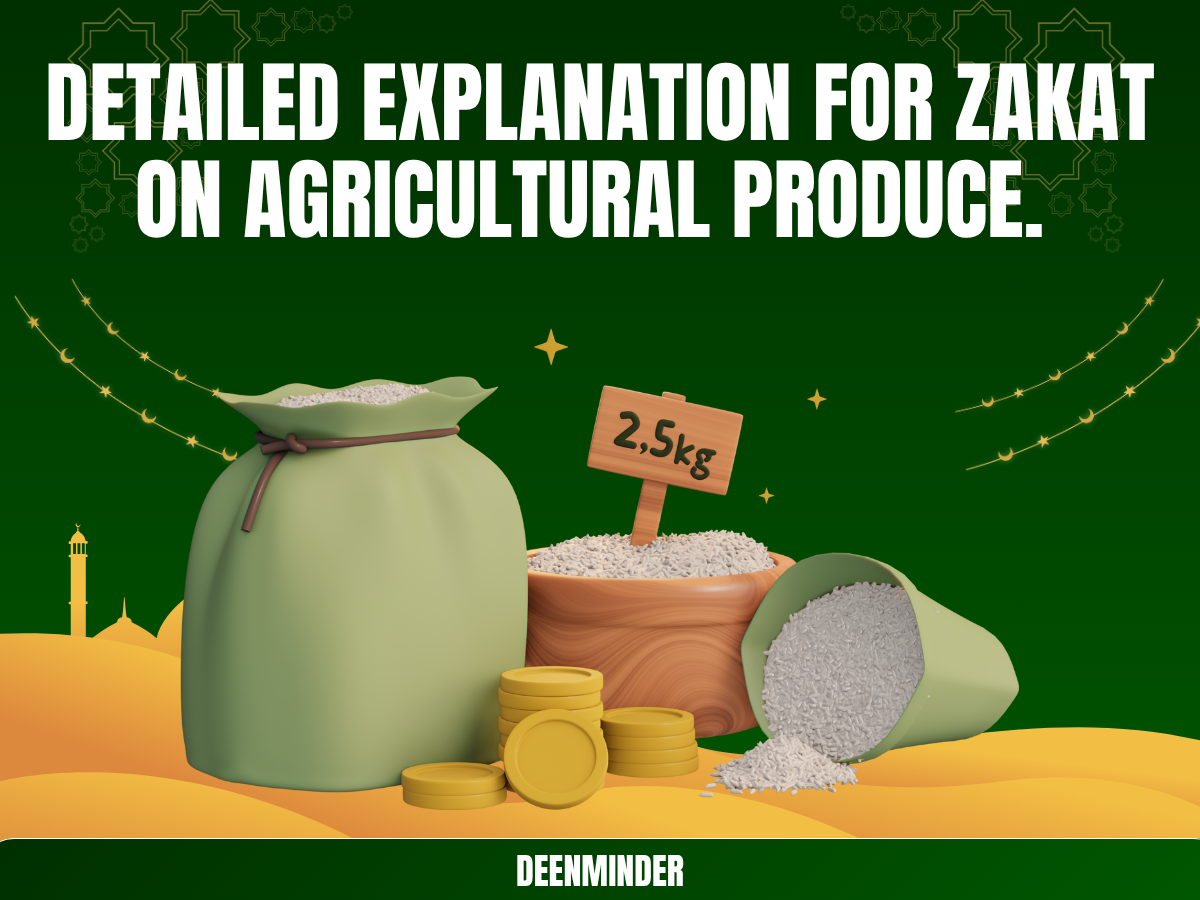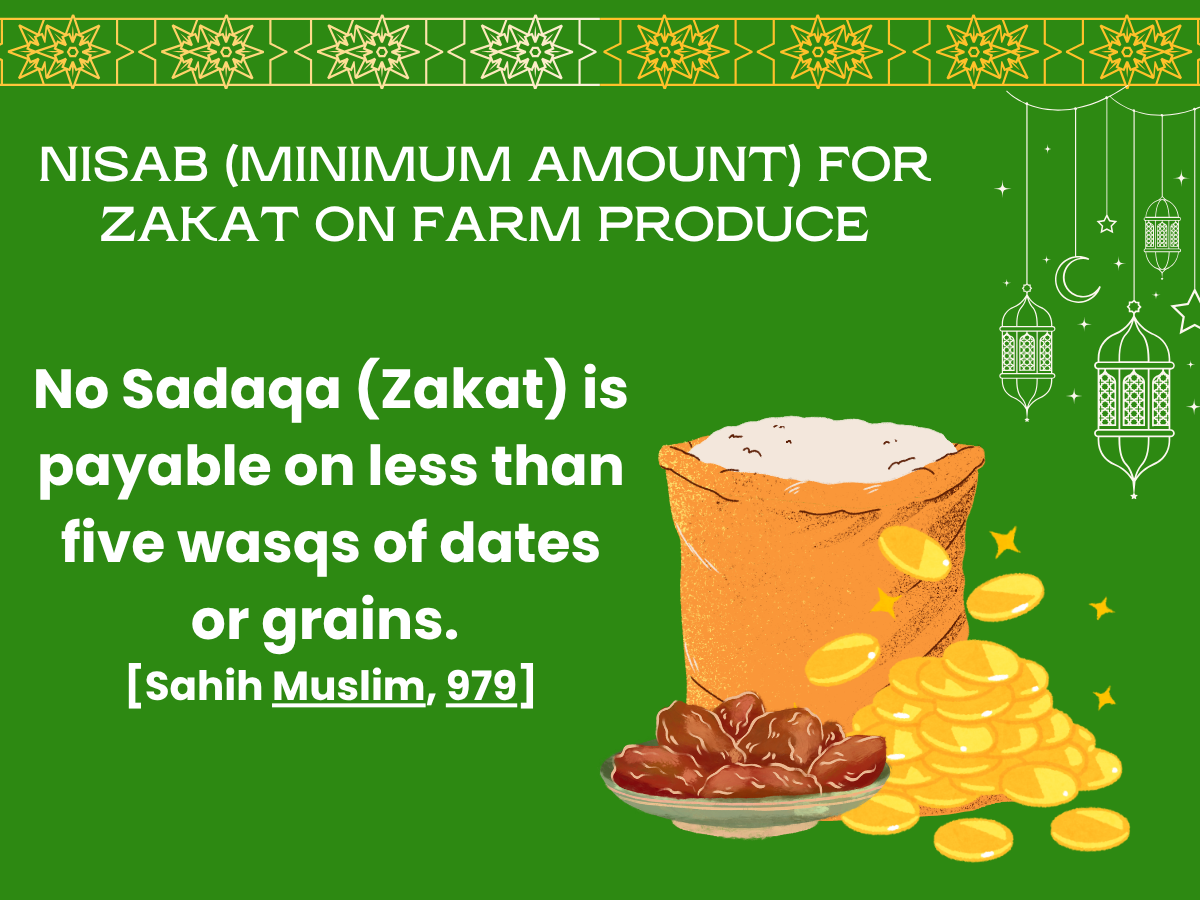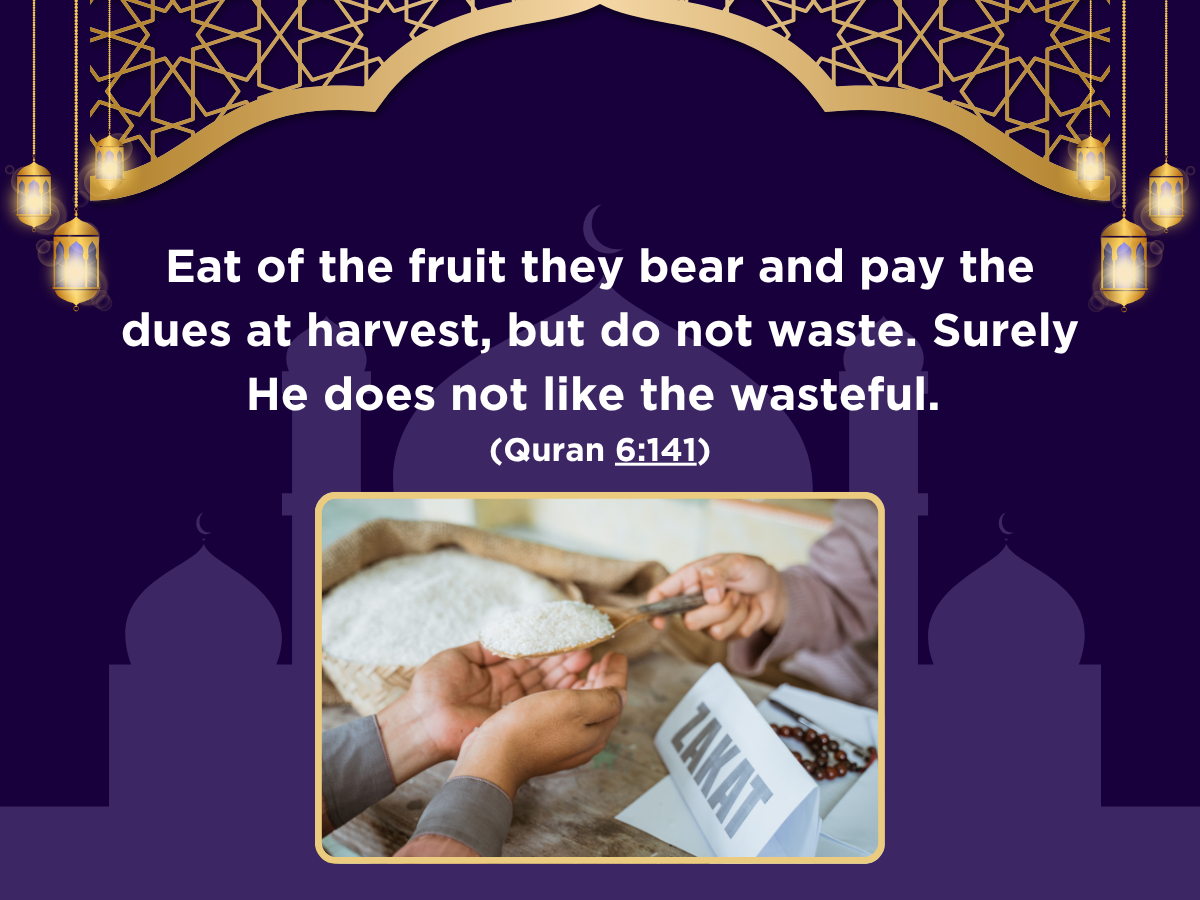Assalaamu Alaikum Warahmatullahi Wabarakaatuh, my dear brothers and sisters in Islam. When most of us hear the word Zakat, our minds often turn to gold, silver, money saved in the bank, or perhaps the livestock (animals) we rear. But there’s another kind of wealth, which Zakat is on it and many overlook it. This is the Zakat on farm produce. Zakat on agricultural produce is obligatory on farmers when they reach its nisab (threshold)
The produce of the land is a blessing from Allah. The wheat, rice, barley, dates, and others are blessings from Allah’s bounty, and are subject to Zakat, known as Zakat al-Zur‘ or Zakat on agricultural produce or Zakat on crop in English. As we know, the real meaning of Zakat is not merely a charitable act, it is one of the five pillars upon which the structure of Islam stands. The command for Zakat on farm produce comes from Allah that…
And He it is who causes gardens to grow, [both] trellised and untrellised, and palm trees and crops of different [kinds of] food and olives and pomegranates, similar and dissimilar. Eat of [each of] its fruit when it yields and give its due [Zakah] on the day of its harvest. And be not excessive. Indeed, He does not like those who commit excess. (Q 6:141)
This concept isn’t merely about giving away a portion of what we harvest. It’s about recognizing the Giver behind every grain and showing gratitude. It’s about purifying the wealth that sprouts from our soil, feeding the poor from the abundance Allah has granted us, and maintaining justice in the economic life of the Ummah.
Observing Zakat on agricultural produce is the cornerstone of communal solidarity, ensuring that wealth circulates and does not become a commodity accumulated by the wealthy only. It is the right of the poor in the wealth of the rich.
Types of farm produce liable for Zakat
We have established the profound obligation of Zakat on farm produce. Now, the question that naturally arises from farmers is, “Which of my crops are truly liable? Is it the lush spinach, mangoes, or the cocoa beans?” The Shari’ah, in its ultimate wisdom, does not leave us in confusion. It provides a clear explanation, distinguishing between what is due and what is exempt, ensuring justice and ease. Zakat on crops includes..
-
Staple food: These are the grains and fruits that people traditionally store and can be rely upon as the bedrock of sustenance. They are not mere supplements or luxuries; they are the foundation of survival. The Prophet (ﷺ) specifically mentioned wheat, barley, dates, and raisins because they were the ideal staples of his time and region.
Scholars are able to deduce a lot of food that resembles the above and classify them under what Zakat on agricultural produce should be observed. The vegetables are exempt from this kind of food. According to the vast majority of scholars, there is no Zakat on fresh vegetables or fruits because they cannot be stored for a long time and perish quickly, like tomatoes, spinach, lettuce, watermelon, and others -
Measurable and storable food: The crop must be capable of being dried, measured by volume (like the Wasq and Sa’), and stored for extended periods without perishing. This characteristic is what allows for the practical application of the Nisab (minimum threshold of 5 Awsuq) and ensures the wealth is tangible and distributable.
Thus, Zakat on farm produce today would include items like rice, dates, millet, sorghum, wheat, and barley since they are stored, measured, and cultivated for sale or sustenance. Any crop that resembles those mentioned upon which Zakat was made obligatory, in being measurable, storable, and beneficial, falls under the same ruling, and Zakat will be due on them too.
What about fruits, vegetables, and non-food crops?
There is no Zakat on farm produce like vegetables, and there is no Zakat on crops like cotton at the time of harvest for these items. They are commercial assets. The Zakat obligation falls upon the money you earn from their sale, which you then incorporate into your annual Zakat calculation on your wealth. That is, you will pay the Zakat on your wealth if you have money that is up to the Nisab (threshold) required.
- Fresh vegetables and perishable fruits: This includes your tomatoes, peppers, lettuce, and others like them. The majority of scholars rule that there is no ‘Ushr (Zakat) on these. Why? Because they are highly perishable, not typically stored as annual staples, and their exemption is a relief from the burden upon the farmer.
- Non-food crops (cotton, timber, flowers): For crops grown for fiber, construction, or decoration, the same principle applies. There is no Zakat on agricultural produce at the time of harvest for these items. They are commercial assets. The Zakat obligation falls upon the money you earn from their sale, which you then incorporate into your annual Zakat calculation on your wealth.
As for vegetables and crops grown solely for trade, their Zakat is based on trade goods, not crops, and their monetary value can attract Zakat if the income reaches Nisab after one lunar year.
Nisab (minimum amount) for Zakat on farm produce
My beloved brothers and sisters, before Zakat on agricultural produce becomes obligatory, the crops must reach a specific minimum amount known in Islamic law as the Nisab. Nisab refers to the minimum threshold of wealth or produce upon which Zakat becomes obligatory. If one’s produce reaches the Nisab, Zakat must be paid; if it falls below, no Zakat is due.
For Zakat on agricultural produce, this threshold is measured by volume and weight, not by value in money. This rule ensures that Zakat is equitable, regardless of the price of the crops in the market. Islam, in its mercy and balance, does not obligate a farmer to pay Zakat on every small harvest. Instead, Allah and His Messenger ﷺ have set a clear, fair threshold that distinguishes between a minor yield and a significant agricultural bounty.
“There is no Zakat on less than five Wasqs.” (A Wasqs equals 60 Sa’s) & (1 Sa=3 K gms App.) (Sahih Bukhari)
No sadaqa (zakat) is payable on less than five wasqs of (dates or grains), on less than five camel-heads and on less than five uqiyas (of silver) (Sahih Muslim)
The nisab (minimum threshold) for this is 5 Wasqs. 1 Wasq is equivalent to 60 Sa‘, and 1 Sa’ is 4 Mudds. The Zakat on agricultural produce doesn’t need to be after a lunar year (1 Islamic year). It is after post-harvesting and preparing the produce fi,t and it reaches this threshold that you will pay its due. The Nisab is also equivalent to 612 or 653 Kilograms (Note that this varies, and double-check the weight in kilograms too for confirmation).
How to calculate your Zakat on agricultural produce from Nisab?
Now, my dear brothers and sisters, we come to the practical heart of the matter. Calculating your Zakat on agricultural produce is very easy. It is a straightforward process by taking into account your own effort and investment. There are two primary rates established by the Prophet (ﷺ), and the third one by the wisdom and research of some scholars.
1. 10% (Al-‘Ushr – One-Tenth) for crops watered naturally
If your crops are watered by natural sources such as rainfall, rivers, streams, or springs, then you must give 10% (one-tenth) of your total harvest as Zakat. This rate applies to crops grown on land that is watered without any significant cost or manual effort to the farmer. This is based on the authentic saying of our Prophet (ﷺ)…
“On a land irrigated by rain water or by natural water channels or if the land is wet due to a near by water channel Ushr (i.e. one-tenth) is compulsory (as Zakat) (Sahih al-Bukhari, 1483)
The reason behind this is that you did not spend money or energy to irrigate, the due Zakat is higher, acknowledging Allah’s direct blessing upon your crop.
Example:
If your rain-fed field yields 1,000 kilograms of rice, then 10% = 100 kilograms must be given as Zakat.
2. 5% (Nisf al-‘Ushr – Half of a Tenth) for crops watered by artificial means
When the land is irrigated through human effort or cost using wells, pumps, sprinklers, diesel, or electric systems, the Zakat due is 5% (half of one-tenth). This rate applies to crops that require costly or labor-intensive irrigation. The Prophet ﷺ continued in the same hadith that…
“and on the land irrigated by the well, half of an Ushr (i.e. one-twentieth) is compulsory (as Zakat on the yield of the land).” (Sahih al-Bukhari, 1483)
This reduction is out of mercy because you bore expenses for water, fuel, and labor. Islam always considers human effort. Whether you draw water using animals, a diesel-powered pump, or an electric pump, you are incurring a cost, be it for fuel, electricity, or maintenance.
Example:
If your pump-irrigated maize field yields 1,000 kilograms, your Zakat will be 5%, which equals 50 kilograms of maize.
3. 7.5% (Intermediate Rate) when both natural and mechanical irrigation are used
Some modern farms today use a combination of rainwater and artificial irrigation. For example, your land might receive rainfall part of the year, but in dry months, you rely on pumps. In this case, scholars such as Shaykh Ibn ‘Uthaymeen and others have ruled that the Zakat on agricultural produce on this method should be 7.5% which is a balanced rate between the two situations.
Example:
If your farm yields 2,000 kilograms of wheat, and you used both rain and irrigation, then 7.5% = 150 kilograms will be the Zakat due.
Shaykh Ibn ‘Uthaymeen (may Allah have mercy on him) said:
“Three-quarters” is the rate that must be paid on that which is irrigated equally by mechanical means and otherwise. Zakah must be paid on it at a rate of three-quarters of one tenth.
For example, if these palm trees are irrigated for half of the year at an extra cost and for half of the year without any extra cost – i.e., in the summer they are irrigated with extra cost and in the winter they are irrigated by rainfall, then three-quarters of one tenth must be paid on their yield.
“If the ratios vary,” i.e., if we are not able to work out whether it is half or less or more.
“That which is more beneficial,” i.e., that which is of most benefit to the palm trees or the trees or the crops, is what counts in this case. If the crops grow more with the irrigation that costs money than if they are irrigated without extra costs, then the rate in this case is half of one tenth, because irrigation with extra costs is more beneficial.
Hence, we have four scenarios, as follows:
1. That which is irrigated with extra costs only
2. that which is irrigated without any extra costs at all
3. that which is irrigated with and without extra costs, and is evenly split between the two
4. that which is irrigated with and without extra costs, but the ratio varies.
If it is irrigated with extra costs only, then the rate of zakah is one-half of one-tenth. If it is irrigated without extra costs, then the rate is one-tenth. If it is irrigated with and without extra costs, and is evenly split between the two, then the rate is three-quarters of one-tenth. If it varies, then we should see which method is more beneficial.
When there is no certainty as to which is more beneficial, the rate is one-tenth. In other words, if they vary and we do not know which is more beneficial, then the rate is to be regarded as one-tenth, because that is more on the safe side and is more likely to discharge one’s duty. Whatever is more on the safer side is preferable.
End quote from ash-Sharh al-Mumti‘ (6/78) (From islamqa 172973)
When is Zakat due on my harvest? (the time of payment)?
The answer to the question “When exactly is the Zakat on my harvest due?” is not a matter of after the lunar year, like that of gold and cash. You won’t wait for the next year for Zakat on agricultural produce. It is after you have harvested from the soil, even if it’s your first year of harvest, and you reach the Nisab mentioned. Its time is ordained by Allah Himself in the Qur’an. Allah the All-Wise says:
“…and give its due [Zakat] on the day of its harvest…” (Surah Al-An’am, 6:141)
This is not directly after you harvest the crops with the soil attached to them, and all other particles, NO. The obligation becomes due at the moment the crop is reaped and gathered, for this is when the bounty becomes fully realized, a tangible wealth in your hands. The time for payment is when the harvested crop has been prepared to the point where it is considered a true, measurable, and marketable asset.
This means after the initial processing that is customary for that specific crop. This means that if your farm crop is wheat, rice, or dates, you do not pay Zakat immediately after harvesting when they still contain husks, dust, or debris. Rather, you wait until the produce is cleaned, threshed, winnowed, dried, and made ready for storage or sale. This is the time of harvest when you have to pay the due.
We have learned that the obligation of Zakat on agricultural crops is not a mere financial transaction, but an act of worship, a definitive pillar of our faith that purifies our wealth, our hearts, and our entire community. It is the practical manifestation of our belief that everything we possess is a sacred trust from Allah, the True Owner.
By returning a small, prescribed portion of this trust, we acknowledge His limitless favor and participate in the circulation of mercy and provision within the Ummah. Let our farmer step forward with confidence and sincerity when his harvest is gathered, knowing that this act of giving is what will secure the true and lasting blessings, the barakah, in his wealth, his land, and his future yields.
We ask Allah to increase us in knowledge and make us among those who give the Zakat of their wealth with souls that are pure, and who fulfill His right upon it in the correct manner. Aameen



